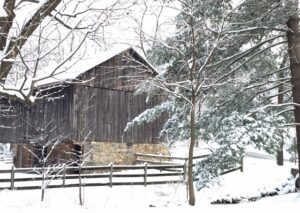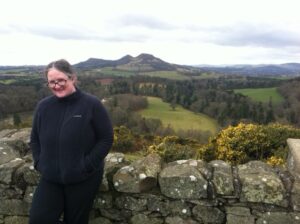 When I draft a scene, the initial result is often what writers call, “Talking heads in a white room.” I hear the scene first: What are the characters saying? What are the ambient sounds? Are the birdies tweeting as harbingers of budding attraction, or is conversation impeded by somebody doing a bad job of minor scales on the clarinet two rooms away?
When I draft a scene, the initial result is often what writers call, “Talking heads in a white room.” I hear the scene first: What are the characters saying? What are the ambient sounds? Are the birdies tweeting as harbingers of budding attraction, or is conversation impeded by somebody doing a bad job of minor scales on the clarinet two rooms away?
I will read over the scene before I close the document and leave myself a note: Where are these people, Grace? What time of day? SETTING, please. The next morning, I begin by buffing yesterday’s new words and that’s when I focus on setting.
 Setting matters. Setting can be full of micro-symbols (cooing doves), foreshadowing (why minor scales, and is there any sneakier instrument than the clarinet?), or create conflict. Is Lord Hopeless trying to propose while a marching band goes by? Is Miss Villainous pouring lies into Our Hero’s ear in the same beautiful lakeside folly where he first kissed Our Heroine three scenes ago?
Setting matters. Setting can be full of micro-symbols (cooing doves), foreshadowing (why minor scales, and is there any sneakier instrument than the clarinet?), or create conflict. Is Lord Hopeless trying to propose while a marching band goes by? Is Miss Villainous pouring lies into Our Hero’s ear in the same beautiful lakeside folly where he first kissed Our Heroine three scenes ago?
Readers are mighty smart, and they pick up on all those cues.
After lacing in some setting and symbolism for once this week’s scenes, I bethought myself about the settings in my life.
 I love to be home. It’s my favorite place in the whole world, though my house is more quirky than lovely. And yet, I rarely get my best writing ideas at home. My happy place for plotting is behind the wheel of my car. I associate my car with safety (hard to flee a natural disaster on foot), mobility, independence, purpose, competence… all good things. I’ve driven every major east-west interstate in the country, and invariably, I did that driving in silence.
I love to be home. It’s my favorite place in the whole world, though my house is more quirky than lovely. And yet, I rarely get my best writing ideas at home. My happy place for plotting is behind the wheel of my car. I associate my car with safety (hard to flee a natural disaster on foot), mobility, independence, purpose, competence… all good things. I’ve driven every major east-west interstate in the country, and invariably, I did that driving in silence.
I can think in the car, My mundane burdens–do I have enough cat food? Did I pay the power bill?–don’t stare at me from the corners of the room, and neither do the dust bunnies and other distractions.

Guess Who at Scott’s Overlook, Scottish Borders
When prisons start showing nature movies in the gym, the incidents of violence go down. The side of a prison that has windows will be less violent than the side that does not. Patients in hospital rooms with windows heal faster and with fewer complications than patients in rooms without windows. Even being able to SEE somewhere else–a different setting–has a beneficial effect on us. (Another reason that setting matters–readers get an imaginary glimpse of somewhere else.)
My theory is that we were hunter/gathers for much, much longer than we’ve been anything else, and we’re predisposed to benefit from regular changes of scene. We do better for wandering around a bit, and exploring the occasional detour. Since the pandemic forced us to huddle at home for three years, anxiety diagnoses have gone up 25%. Not a straight line correlation, but might be something causal in the mix.
Hence, my question: How, when, and why do you change scenes?







I, too, prefer my home over any place else. I always wanted to be able to tell Scotty to beam me somewhere since I wanted to be there, but not get there. But I also make sure I can see the outside while I’m at my computer (I have to turn my head to the side but not much) or reading and I always want to open all the curtains/blinds when I start my day. During the summer here in Florida, I keep everything closed to keep the heat out but during my lunchtime, I do open a couple just for the light, then close them up when I’m done. I like light and nature a lot but don’t have to be out in it, if that makes sense. I just need to know it’s there. I visit the world mostly through books.
My partner is the true hunter/gatherer as he is the one who does the shopping and will be gone for hours on his expeditions. If I have to go shopping, I want to get in and get out and get home. (Unlike all 3 of my sisters, I have never liked shopping and they wonder how I ended up in the family!)
I think my most important setting is outdoors. If I don’t get outdoors enough, I get very grumpy and down. Daily outdoor time is critical to my peace of mind! Bonus points if its outdoors exercise.
And yes, having some changes of venue- going to new places- is also a very good mental break!
Change of scenery is sometimes the only way to break a bad mood for me. We have woods nearby and being in the woods for 20 min is a reliable reset. This summer of bad air was really hard because I could only change my scene to another indoor venue, I learned to prioritize getting out on the decent air days. Like you, Grace, I am a homebody but need to move through space and see new vistas to keep my mind happy and moving forward. I have been mulling over what my next phase will be and have needed movement to help think things through.
A friend of mine had a blind author in their writing group and I remember a conversation we had about how that impacted the way this other author set the scene. I hadn’t thought about how our own sensory experiences inform writing a setting since I am not an author, but I read with that in mind now and it is interesting to me to notice differences between authors in what sensory information is included or not.
Pingback: Dramatically Yours | Grace Burrowes | I believe in love.
Getting outside is good for me, but it’s so easy to stay cooped up in my house. Whether it is eating or reading on the back porch, walking in the neighbor or even doing yard work I’m always in a better mood when I’ve spent time outside.
I don’t let my mind wander too much when I drive – that causes me to miss my turns! However when I walk I love listening to nature and I let my mind wander. I often come up with new ways to approach things that are vexing me.
Generally, I need a reason to leave the house. Currently, I am in the SF part of CA paying the first visit our son has allowed us. (Roughly 2.5 years) And, yes, we do get along. Mostly.
It has been interesting to compare the San Diego area (our usual go to) to this one far enough south of SF to be a little warmer, a little drier than SF. I haven’t been in this part of CA in about 40 years, so that’s different, too. There are enough EVs and hybrids on the road that the noise on the freeway is less, even with more traffic… but then my memory might be faulty, too!
The sea lions are still noisy, bossy and multitudinous!
PS I’m not sure about the clarinet. I played one. Badly. Peter & the Wolf had a sneaky clarinet. I’d go for cello or oboe.
There’s a reason why I’m a reader and not a writer. In books, to focus on other characters, to allow a secret to be told, for something important to be revealed. My most constant changes of scene are work, home, grocery store, and driving to and from these places.
Since I got my drivers license at age 16, I was the family designated driver. My father became anxious when driving because of some deaths in the family from car accidents in the 1930s and my mother was just a terrible driver. I became her map reader by age 7.
Driving is my happy place also. I live in New Hampshire and driving the country roads with classical music is delightful. I spend time on the road making plans and thinking about things.
Unfortunately our love of driving is running a collision course with global warming. In 1973, I wrote a paper at Stanford in civil engineering graduate school about how a wide band of trees either side of the freeways would stop smog at the source. I’ve been trying to get our state government in New Hampshire to widen the freeway easement either side of the highways to stop the global warming car emissions, but it seems to be too simple a solution!